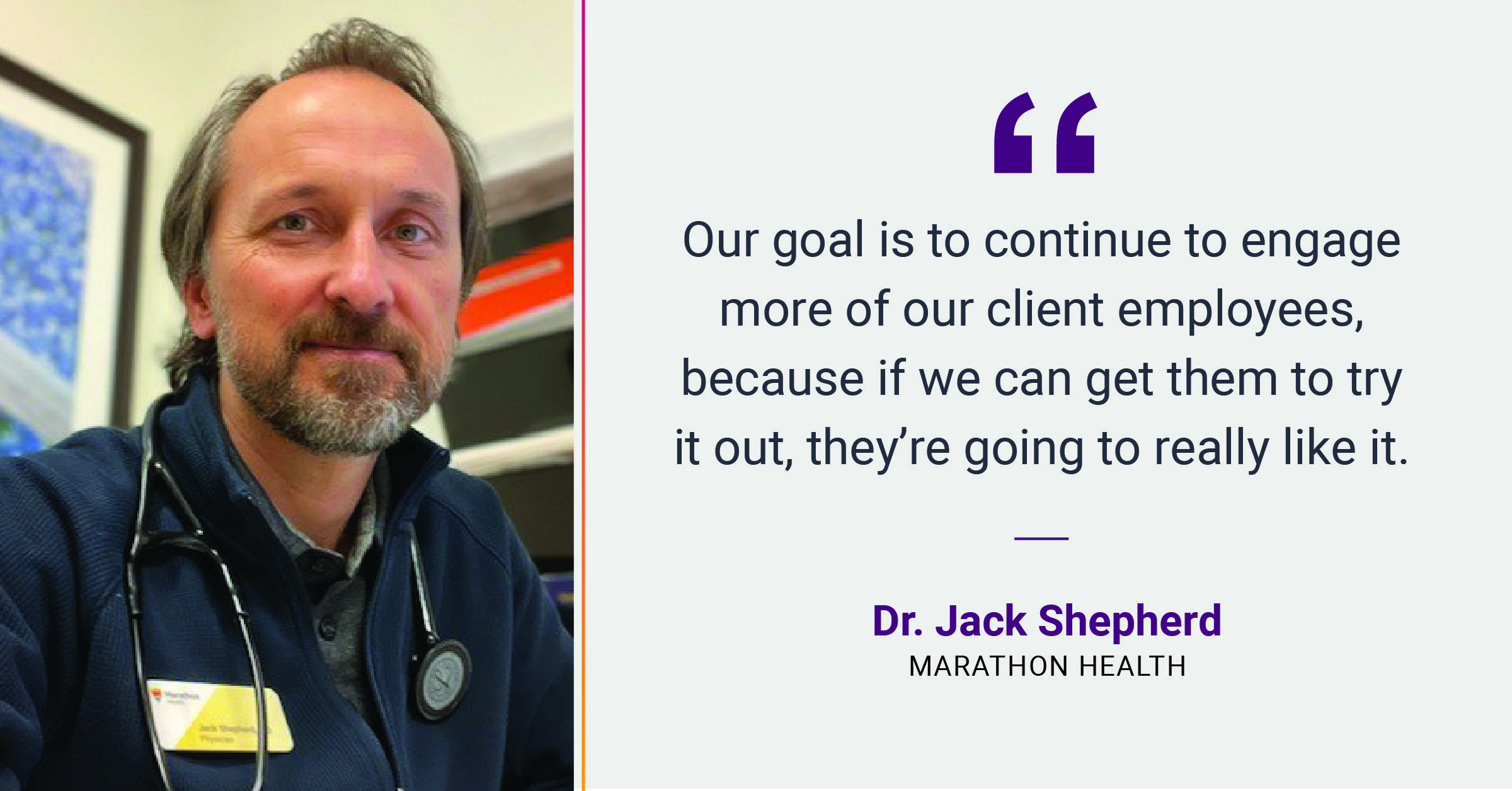A Day in the Life: Employer Network Health Center Doctor Values Quality Time with Patients
March 20th, 2023 | 3 min. read

Marathon Health’s one-on-one series highlights the role different care providers play in improving employee health. In this blog, we spoke to Dr. Jack Shepherd about how he helps patients lead healthier lives at an employer Network health center.
Dr. Jack “Trae” Shepherd’s medical career spans over two decades, including a four-year stint practicing rural care in the Virginia mountains and working in urgent care and occupational medicine across the Charlotte, North Carolina, area.
Today, Dr. Shepherd sees patients at Marathon Health’s Albemarle Crossing location, one of six employer-sponsored Charlotte Network Health Centers strategically located around the greater metro area.
The Network centers provide advanced primary care, wellness services and chronic condition management, among other services. Multiple employers utilize the shared Network, including the City of Charlotte and Mecklenburg County. The eclectic mix of employers means he sees a wide range of health center members with a diverse mix of health concerns. Put simply: Each day brings something new.
“We see the firemen, policemen, social workers and a broad swatch of other people from various employers,” Dr. Shepherd says. “Lately, I’ve had a lot of patients from solid waste disposal and the water department. They tend to have pretty physical jobs.”
On a typical day, Dr. Shepherd helps patients with common issues like diabetes, hypertension and lipid disorders, but also treats patients with depression, anxiety and acute injuries. Health center members have the option to meet with Dr. Shepherd in-person at the health center or schedule a virtual appointment. A normal day involves both.
“People became comfortable with virtual visits during the pandemic, so we still see many of our patients that way,” he says. “And what I’ve found is that for a lot of the chronic disease management we do here, many of the follow-up visits can be done virtually. It’s very convenient for patients.”
Employer Network Health Centers Focus on Team-Based Approach to Care
Dr. Shepherd works collaboratively with a multidisciplinary care team at the Network health center, including behavioral health specialists, physical therapists, health coaches and diabetes educators.
“Having a behavioral specialist here as part of the team that can come alongside me to help with therapy is invaluable,” he says. “We’ve had a lot of shared patients. I’ll typically focus more on managing any medications that may be involved, while the behavioral health specialist works with them through a variety of talk therapies.”
The in-house multidisciplinary care team not only improves collaboration, it also benefits health center members, as they can often walk down the hall to visit a health coach or have a diabetes educator join their appointment. It also removes barriers of scheduling with an outside provider and paying additional costs.
“One of my patients recently had some neck surgery and was given a referral for physical therapy. He said, ‘Can I get this physical therapy here? Because, I worked with Jenn [on-site physical therapist] a year ago for something else and she was great,’” Dr. Shepherd says. “So, I went down the hall, showed her the prescription, and she said she could absolutely help him. It was convenient for the patient, there was no out-of-pocket expense and it was with a therapist he already trusted.”
Value-Based Care at Employer Health Networks Focuses on Improvement, Not Profits
Many medical systems operate on a fee-for-service model, yet Dr. Shepherd says Marathon Health’s focus on delivering value-based care drove him to the organization. With a value-based model, providers are rewarded based on improving patient health outcomes, rather than the number of patients they see or services they provide.
Rather than trying to maximize the number of visits, Marathon Health providers see a limited number of members each day, which allows them to spend quality time and dig deeper to uncover the root of the problem. And because employees can use the health center as much as needed, usually without a copay, they’re more likely to follow through until they resolve their issues.
“We aren’t just seeing patients to see them — we’re actually producing results. It’s so nice to be able to work in an environment where that’s the goal,” he says. “I tell some of my patients, ‘Look, you’ve got so much stuff going on it’s gonna take us multiple visits, but it’s not a big deal at all. It’s just your time spent coming over here.’”
Dr. Shepherd says the longer appointment times don’t just allow him to treat the whole patient, but help him forge relationships and help health center members feel comfortable reaching out for care. “I’ve had innumerable patients tell me how they enjoy the experience and especially don’t feel rushed when they’re here,” he says. “They compare it to their previous healthcare experiences and they just love it. Our goal is to continue to engage more of our client employees, because if we can get them to try it out, they’re going to really like it.”